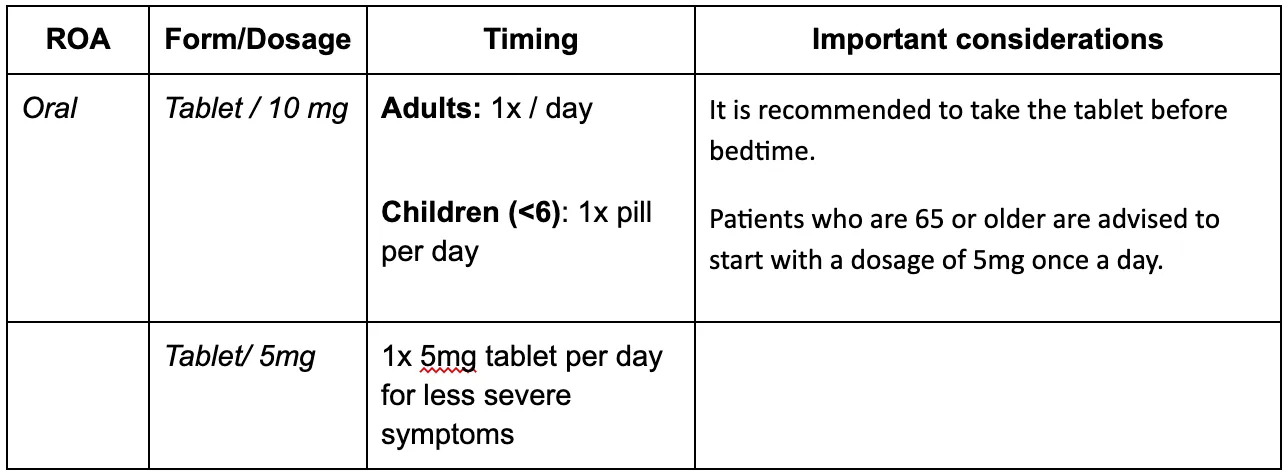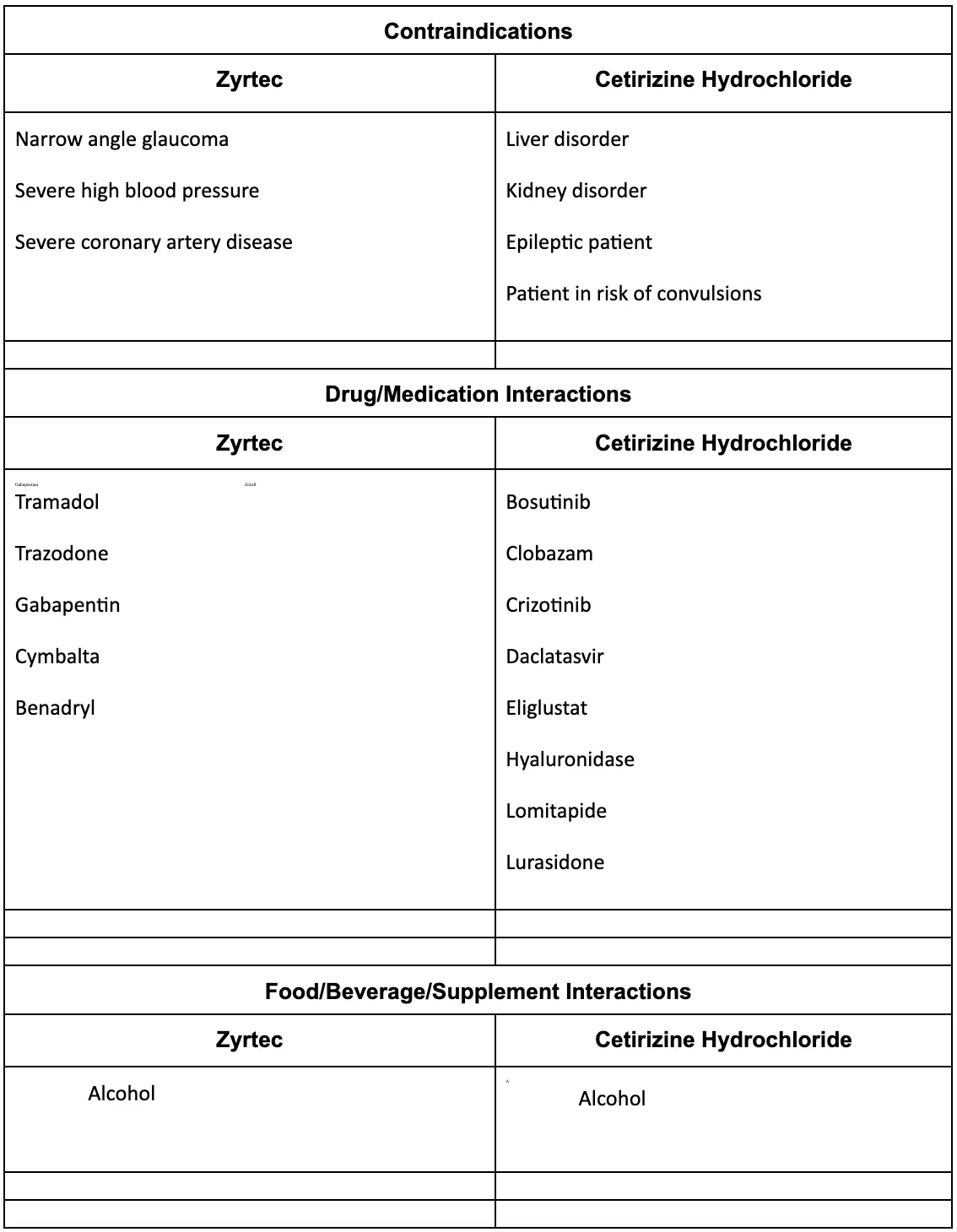Zyrtec vs. Cetirizine Hydrochloride
Introduction
Antihistamines are a type of drug that are used for the treatment of allergies. This class of drugs are mainly use to counter the effects of histamine which is a chemical that is produced in the immune system. Antihistamines are commonly used for the treatment of allergic reactions to allergens, such as pollen.
About Zyrtec and Cetirizine Hydrochloride
Zyrtec and Cetirizine Hydrochloride are antihistamines that are used for the treatment of symptoms caused by allergies. Zyrtec and Cetirizine Hydrochloride are normally used for alleviating the symptoms caused by allergic rhinitis and urticaria.
What is Zyrtec?
Zyrtec (cetirizine hydrochloride) is a class of drug that is known as an antihistamine. It is mainly used for the treatment of itchy nose, runny nose, sneezing and watery eyes.
What conditions is Thrive approved to treat?
Zyrtec also works on those who are allergic to dust mites and molds, and is available in both over-the-counter and generic form.
How does Thrive work for Allergies?
Zyrtec works by binding to histamine receptors that are in the immune system of the body, preventing the histamine from effecting other receptors. This in turn, helps to reduce the symptoms that are associated with allergic reactions. Since Zyrtec works as a peripheral histamine receptor, it does not result in the feeling of drowsiness.
What is Cetirizine Hydrochloride?
Cetirizine Hydrochloride is an antihistamine that is used for the treatment of allergic reactions, which includes, skin rashes and hay fever.
What conditions is Cetirizine Hydrochloride approved to treat?
Cetirizine hydrochloride is approved to treat symptoms caused by allergic reactions such as, itchy and red eyes, runny nose, etc., which are caused by conjunctivitis and hay fever. Cetirizine hydrochloride is effective for the relief of skin rashes as well such as, chronic nettle rash and idiopathic urticaria in both children and adults.
How does Cetirizine Hydrochloride work for Allergies?
Cetirizine hydrochloride works as an antihistamine by blocking the effects of too much histamine production in the body's immune system. Histamine is the substance that leads to allergic symptoms in the body.
Effectiveness
Both Zyrtec and Cetirizine Hydrochloride are an effective class of medications that are known as antihistamines. Antihistamines work by helping block the actions that are carried out by a substance called histamine, which is responsible for causing allergic reactions in the body.
How effective are Zyrtec and Cetirizine Hydrochloride for treating Allergies?
It should be noted that while antihistamines such as Zyrtec have become the go-to option for the treatment of allergic reactions, second-generation antihistamines such as Zyrtec have been known to only be partly effective against symptoms such as sneezing and runny nose caused by an allergic reaction. That said, Zyrtec is a fast-acting drug that starts to work in less than an hour the first time you take it. Cetirizine hydrochloride is also a fast-acting antihistamine that can alleviate the signs and symptoms of an allergic reaction in under an hour of taking the medication.
Dosage information
As with using any medication, it is important to make sure that you follow all of the instructions and recommended dosage to get better results. Following dosage information will ensure that you get the benefits of using the drug quicker without having to experience any of the unwanted side effects that are known to accompany various medications, including antihistamines.
How is Zyrtec administered for Allergies?
When using Zyrtec, the recommended dose is 10mg to be taken only once every 24 hours. This dosage is to be followed by both adults and children who are using Zyrtec to alleviate symptoms caused by allergies.
Zyrtec Dosage Information

How is Cetirizine Hydrochloride administered for Allergies?
Cetirizine Hydrochloride dosage information

Side Effects
What are the most-common side effects of Zyrtec?
While Zyrtec is considered as a non-drowsy antihistamine, it is possible for users to experience some side effects when using the medication for the first time.
- Dizziness
- Dry mouth
- Diarrhea
- Headaches
Are there any potential serious side effects of Zyrtec?
Very serious allergic reactions to taking Zyrtec is rare however, some potential serious side effects have been reported after the use of Zyrtec such as;
- Trouble breathing
- Severe dizziness
* If you experience any of these serious side effects, seek medical help immediately
What are the most-common side effects of Cetirizine Hydrochloride?
Cetirizine Hydrochloride is considered to be a non-drowsy antihistamine. However, some of the common side effects may be experienced by those who are using the medication for the first time. Some of the most common side effects of using Cetirizine Hydrochloride include;
- Dry mouth
- Dizziness
- Headaches
- Diarrhea
Are there any potential serious side effects of Cetirizine Hydrochloride?
Some potential serious side effects that are related by Cetirizine Hydrochloride includes;
- Trouble breathing
- Severe dizziness
* If you experience any of these serious side effects, seek medical help immediately
Contraindications and Interactions
Contraindications for drugs include situations that can make using the drug more harmful. Contraindications are not similar to side effects, since they are situations that a drug should not be used.
Warnings and general precautions for Zyrtec and Cetirizine Hydrochloride
Zyrtec does not result in any serious side effects, however, Zyrtec may have an adverse effect if an individual is also using other medication that also make the user sleepy. When taking Cetirizine Hydrochloride, the tablet must be swallowed with a glass of liquid. When using Cetirizine Hydrochloride, it is important to adjust dosing intervals according to the patient's renal function.
Contraindications and important interactions for Zyrtec and Cetirizine Hydrochloride

Cost Comparison
Cetirizine Hydrochloride is available in packs of 30, while Zyrtec is also available in packs of 30 tablets each.
How much do Zyrtec and Cetirizine Hydrochloride cost?
Cetirizine Hydrochloride tablets 10mg is available for $11 for a box of 30 tablets. This comes to $0.3 per tablet. Zyrtec is available in a bottle that contains 30 tablets and costs $22.97 per bottle. This comes to $0.7 per tablet.
Popularity of Zyrtec and Cetirizine Hydrochloride
Cetirizine Hydrochloride has an average rating of 5.8 out of 10, while Zyrtec has earned an average rating of 5.8 out of 10 on Drugs.com, which means both these antihistamines are relatively popular because of their effectiveness.
Conclusion
Zyrtec and Cetirizine Hydrochloride have a considerably long half-life of 10.6 hours, which means, users only need to take a single dose of these medications every 24 hours for the treatment of allergies.
Takeaway
While both Zyrtec and Cetirizine Hydrochloride are effective in the treatment of alleviating the symptoms of allergic reactions, they also tend to cause drowsiness in users.